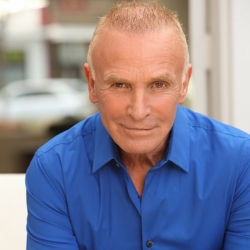Now, in this last section, I’m going to discuss one of the biggest questions I get asked by men of all ages, at least all ages starting at 45 — “Should I go on testosterone therapy?”
That’s the question a friend of mine in his mid-40’s asked me when he spoke to me confidentially about a problem he was experiencing — loss of interest in sex.
This particular guy had a lovely wife he’s crazy about, and her desire for sex hadnot diminished — so the poor guy was having a real problem. He just wasn't that interested, and when the spiritwas willing, the flesh didn’t always cooperate.
What’s more, he felt he was losing his edge in general. His energy wasn’t what it used to be, he wasn’t sleeping all that well, and — although a lifelong athlete — he had noticed a little bit of a beer gut beginning to creep out over the waist of his jeans. And he didn’t even drink that much beer!
My friend’s doc told him his testosterone was on the “low” side, but “normal for his age.” (General note about health: “Normal for your age” is not something to aspire to.) My friend wondered if he should visit one of the local “Low-T” clinics that seem to be springing up in every strip mall, at least in Southern California. These clinics promise a quick fix. They do a blood test to check your T level, and then—if it’s low, which it almost always is — they give you a scrip and tell you to come back for a re-check in a year.
The quick answer: NO!
Now let me be clear.I’m a huge fan of hormone replacement therapy and, full disclosure, I’m on it myself.(More about my personal experience in a minute.) But hormone replacement therapy is a very different animal from what the “Low-T” clinics do.
Hormone replacement therapy is terrific. Low-T clinics are dangerous.
You see, hormones are an intricate assortment of chemical messengers that control or influence just about everything that you do, feel, or even think. And they’re connected in an intricate web that’s as complicated and interdependent as a symphony orchestra. You can’t just “fix” the volume on the tuba without balancing the piccolos. Trying to “fix” a low-T level with a shot of T is as irresponsible as trying to “fix” a complicated electrical motherboard by yanking on one wire.Whether youmake it ortakeit, whenever testosterone enters your bloodstream some of it winds up metabolized into other compounds. One of these compounds is DHT (di-hydrotestosterone) which can cause hair loss and annoying prostate enlargement (think multiple trips to the bathroom at night). Some testosterone metabolizes intoestradiol,a female hormone. We men need some estradiol for bone protection. But if we make too much of the stuff, we start putting on fat in what’s called “estrogenic” patterns (i.e. butt, thighs and hips). Doctors who specialize in this kind of thing — it’s calledage-management medicine-- will monitor every one of these metabolites carefully and make the proper adjustments. A low-T clinic won’t even look at them.
Besides testosterone, hormone replacement therapy involves a host of other hormones and nutrients that could be affecting the very things men complain about the most, like energy. Take thyroid, for example. Or DHEA. These need to be measured, replaced if necessary and maintained at optimal levels. Your doctor should also check cortisol, insulin, HGH, IGF-1 and various nutritional markers as well. (I, for example, have been on weekly methocabalymin (B-12) shots as a part ofmy overall program. They make a huge difference.)
Low testosterone
Low testosterone is associated with a broad range of physical, physiological and sexual symptoms, including decreased energy and mood, fatigue, loss of muscle mass, depressed libido, and erectile dysfunction. And testosterone isn’t just a “vanity” hormone — low testosterone has been associated with a number of serious medical conditions including diabetes, cardiovascular disease and metabolic syndrome.Since this column began, I’ve never been shy about recommending brands I personally use and believe in, or those I think are the best in their category, regardless of who makes those products or offers those services. My personal choice for hormone replacement therapy is the oldest age-management practice in the country, Cenegenics. Having my hormones optimized has been one of the biggest factors in how I feel at age 71.
Which is pretty darned great.
There are other medical practices across the country that do terrific work with age-management medicine. Many of these physicians were even trained by the non-profit Cenegenics Education and Research Foundation, which offers a two-year fellowship in age-management medicine. If youdodecide to go for hormone replacement therapy my only advice is that you go to someone who really knows what they’re doing and follows the Cenegenics protocol. That’s what I did. That’s what you should do.
And when you go shopping for the right doctor, remember this wisdom from an anonymous sage whose words were written on a plaque hanging in the office of an integrative physician friend of mine:
Never try to get a bargain on:
- Scuba diving equipment
- Parachutes
- Hormone replacement therapy
Jonny Bowden, “the Nutrition Myth Buster,” is a board-certified nutritionist and the best-selling author of 15 books including The Great Cholesterol Myth, Living Low Carb, the 150 Healthiest Foods On Earth and Smart Fat. To learn more about healthy living, motivation and nutrition, visit jonnybowden.com.
best-selling author of 15 books including The Great Cholesterol Myth, Living Low Carb, the 150 Healthiest Foods On Earth and Smart Fat. To learn more about healthy living, motivation and nutrition, visit jonnybowden.com.
Note: The statements presented in this column should not be considered medical advice or a way to diagnose or treat any disease or illness. Dietary supplements do not treat, cure or prevent any disease. Always seek the advice of a medical professional before altering your daily dietary regimen. The opinions presented here are those of the writer.










